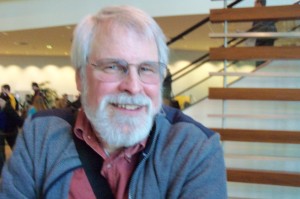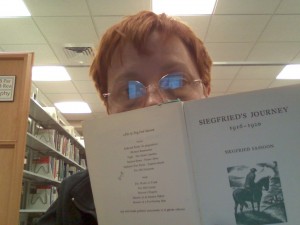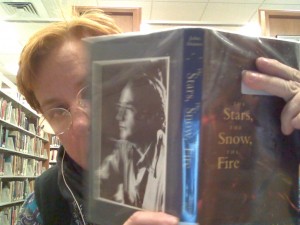Back amongst the biographies
I really must catch up on some serious writing!
I lost a certain amount of time in the run-up to Arisia, and at Arisia, and now some extra post-Arisia biz. It was decided that we judges should provide the contest winners with some actual feedback, so I was up late last night attempting to manifest sagacity, gentility, laser-like analytical brilliance, and kind-heartedness simultaneously. I don’t know if I managed all that, but I did enjoy the process. Plus: I’m smarter at night, and I miss being up in the small hours to witness my own smartitude. Alas, the DayJob forces me to be conscious in the morning, at the sacrifice of the deeps of the night.
I did manage to write a bit at the convention:
And of course, hanging with pals is half the point of a convention:
Yeah, here’s his website.  And this is his blog. Check out his books!
Yikes.  I’ve spent too much time blogging, and not enough actually writing.  Gotta go —
But first, your obligatory random quote:
“It now seems odd and almost incredible that while in [T.E.] Lawrence’s company, I should have said nothing about Thomas Hardy. How, I wonder, did I get through the evening without it somehow transpiring that I was on the eve of an inaugural visit to Max Gate? How, on the other hand, could I have guessed that Lawrence honored him — as I did — beyond any other living writer (although it was not until 1923 that he became, probably, the most admired and valued friend of Hardy’s last years)? My own association with Max Gate had begun early in 1917, when I wrote to ask Hardy to accept the dedication of The Old Huntsman. In doing this, I had been encouraged by my uncle Hamo Thornycroft’s having known him for many years, and by the fact that Mr. Gosse had assured me that the request would give pleasure to ‘True Thomas,’ as he called him.”   Â
— Sigfried’s Journey 1916-1920, by Sigfreid Sassoon, Viking Press, 1946
I’m sorry.  When Hamo Thornycroft’s name came up, I could not stop laughing.  Forgive me.



